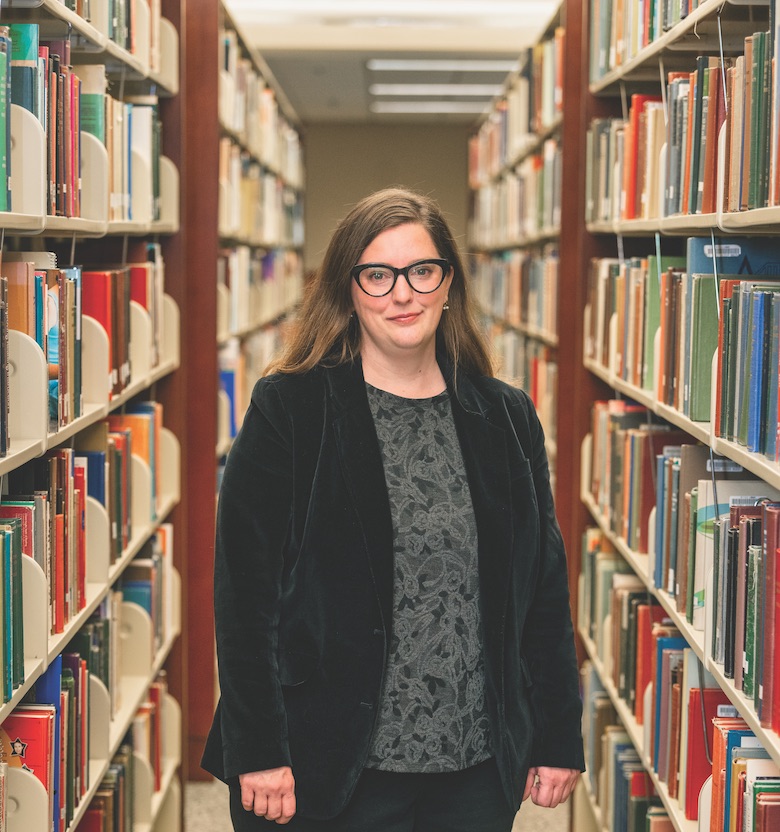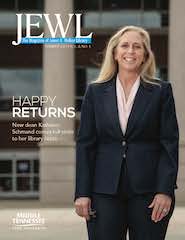What could you have done with an extra $1,000 in college? Would that have covered a rent payment or two? Maybe freed up funds for a car repair you’d put off? Perhaps it would have let you take a little more time off from your job to focus on your classes.
Walker Library is working to give students that budgetary wiggle room by offering less-expensive textbook options.
Since the 1970s, the cost of textbooks has skyrocketed more than 1,000%. At MTSU, students are expected to budget on average $1,240–$1,440 for books and supplies per academic year. However, the average college student will end up spending $415. Why is this? Often, students go without buying books, or they decide to share—choices that can lead to poorer academic outcomes.
Walker Library has targeted this issue over the past two years, initially with the adoption of the Library Textbook Program, which offers textbook checkout for many of MTSU’s General Education classes. It’s a program that has its eyes set on future expansion, but it addresses only a portion of the needs facing today’s students.

Suzanne Mangrum, acquisitions librarian for MTSU’s James E. Walker Library.
“The Library Textbook Program, as important as it is to us, is only a Band-Aid,” said Suzanne Mangrum, MTSU’s acquisitions librarian. “We’re only able to cover certain classes, and there is a lot that doesn’t get covered.
“Students have access to these books, but I wouldn’t call it great access, with it only being three-hour blocks within the building. During the pandemic, that wasn’t ideal. We also try to make sure the library can offer similar services to our online students, but it is often not possible to get e-books for the assigned texts.”
Another solution, however, is picking up steam across the University, as evidenced by a recent $100,000 grant from the Tennessee Board of Regents. The grant will establish a pilot program for open educational resources (OER) that ultimately will provide free or low-cost textbooks to MTSU students.
“I think there’s always been a group of faculty with a heart for students and who know that some students can’t afford textbooks,” said Mangrum, who serves on the steering committee for the program at MTSU. “There were already some faculty members who were using OER, and you’ll always have some early adopters. But it is a lot of work to create your own curriculum, and it’s not a small amount of work to find the right OER textbook.
“There is a lot of good, high-quality work out there, but finding it, downloading it, adapting it, and then saving it in a way that can help your students takes time.”
This is where Mangrum believes Walker Library can make a major impact.
“One of the main purposes of the grant is to encourage faculty to consider adopting an OER textbook for their courses. There are two big roles that the library can play in this, and the first will be supporting a publishing platform,” Mangrum said. “We can teach faculty about the platform and the publishing progress. The other will be in helping with Creative Commons licensing.
Students are expected to budget $1,240–$1,440 for books and supplies each year.
“I think there are a lot of questions about how something can be free and still valuable. Why should faculty take their valuable work and give it away? But that’s not really what they’re doing. It’s shareable, but they still own it and get credit.”
While the University remains in the early stages of implementing its OER program, the path forward is exciting.
“When I first came here 15 years ago, I’d get taken out to lunch by vendors, and they’d talk to me about their catalog,” Mangrum said. “We’d try to talk to faculty about it and then make selections to build a library collection that supported our academic programs. That is gone. My job has become more about licensing access to content for a time.
“We own so much less than we used to, and we license so much more. I think OER gives us a chance to get back to our true mission, which is that information is for all and should be freely available.

What Is OER?
Open educational resources (OER) are essentially open-source textbooks that are available to students online. They also can be printed, in many cases, for the cost of producing the material.
“OER textbooks are free and openly licensed,” MTSU acquisitions librarian Suzanne Mangrum explained. “They’re free to copy, to distribute, or even to change up if you want to. You have a lot of permissions with them.
“Students can have an e-copy or even a printed copy, if they’d like, and they can keep it. It’s a great improvement over sharing it with a friend or relying on the library to hold a copy. It’s the access that makes it better.”
The ability to edit is a huge boost to faculty who are often tasked with adapting a course around an imperfect textbook.
“OER hits a lot of sweet spots,” Mangrum said. “It saves students money, but it also creates a more engaging classroom experience. Faculty don’t always find what they need in the textbook anyway, especially in terms of diversity. They’re having to supplement and add in other voices. Now there’s a way to do just that and make it open. The result can be a more engaging textbook without having to pass the cost to students.”
—Clay V. Trainum



COMMENTS ARE OFF THIS POST